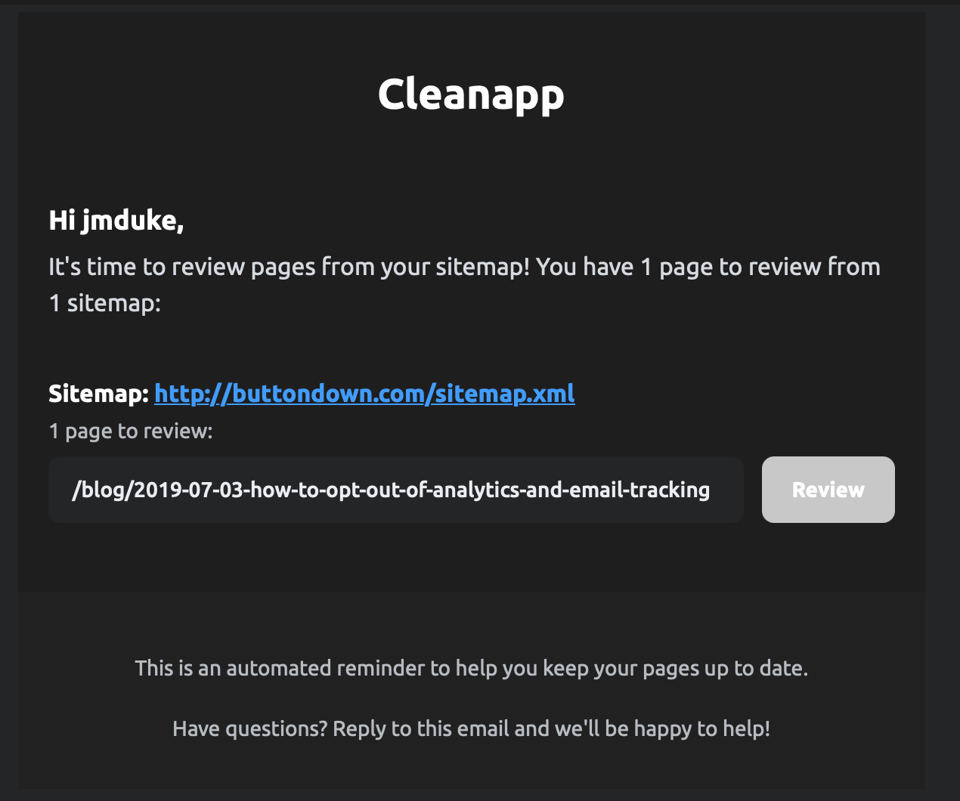CleanApp; Patreon; Indices; Support
2025-11-03
CleanApp

A few weeks ago, I wrote about wishing that an app to let you Anki your marketing site pages existed, and my friend Rasul built exactly that. I highly recommend you go out and try it:
I have had my account active for six days as of writing this, and therefore have received six marketing site pages every morning. Four of those six pages are ones that I have not looked at in over a year, and I immediately found small issues or improvements to all of them. It's a very small little ritual, but one that feels particularly high signal to noise relative to other ways I could throw spaghetti at the wall. (Thanks, Rasul!)
Patreon
It feels both crass for me to opine on this and silly for me not to: Patreon is essentially running Substack's playbook against it, luring over some of their larger writers with upfront commitments.
From a game theoretic perspective, the argument for doing this is a simple one: Patreon has presumably a decent amount of cash reserves that they're not investing in other things and they believe that whatever amortized upfront costs there is in growing the size of their network will be offset by the value of the network effects and lock-in, either implicit or explicit, that ensues.
I'm not fundamentally against the theory behind the theory, so to speak — it makes sense, but I remain fairly bearish on the concept of “network effects for writers staying within any walled garden”, no matter the height or translucency of the walls.
We have made a conscious choice not to pursue social networking and not to pursue community building across authors (even though that a perfectly rational thing for authors to want!) — it is not the game we want to play, and nothing in that realm has really changed.
One exception to all of this “meh”, though, is my one true concern with this move — paid subscriptions.
Many of Patreon's users cannot migrate off of Patreon because Patreon has rolled their own payments infrastructure, meaning that an author looking to leave Patreon and go to another service would be unable to do so without having to recreate those transactions themselves and ask existing patrons to re-subscribe. It’s not super obvious how widespread that is — Patreon’s docs mention Stripe a lot, so perhaps they’ve moved over fully to a Connect model — but it’s something we need to get a much better understanding of.
Indices
Mati is still plugging away at evaluating a new vendor for our rapidly-growing RDS instance, and one sidequest in service of that is slimming down our database. He discovered that around ~300gb of storage was allocated towards indices that have never been read, which, yikes.
We’ve since purged those indices; I went the extra mile and wrote a short checker to ping us whenever an unused index (defined as “no reads within 30 days”) surpasses a gigabyte. The list of things that are roughly described as "oh, you know what it might be? check this —” easily grows mammoth: any chance we get to let the machines remember for us, we must take with two hands outstretched.
Docs site
I talked a little bit about this in Planning; Database; Onboarding; Home!, but one downside of being a general-purpose tool that is both used by consumers and businesses means that there's a lot of things that we have to say at a lot of different levels of depth of the business:
There are people who are starting a newsletter for the first time versus people who are importing data;
There are people who are primarily just interested in sending out to friends versus people who are interested in monetization;
There are people who know what HTML is, and people who do not;
et cetera, ad infinitum.
One of the big challenges is how we balance the main quest and the side quests, while knowing (to really torture the MMO metaphor) that some people want to turn the tutorials off and just jump to the endgame.
There is surprisingly little prior art here. I turn to the usual suspects and am left wanting:
Stripe’s exploratory documentation is, despite their reputation, extremely fuzzy.
Attio’s docs are much more unified and narrative, but lean heavily on video (which might be the right move, but is a hard pivot for us to make)
Things’ docs are great, but underscore the fundamental simplicity/isolation of the product
One thing I discovered in my survey that we are solely missing: Linear has a conceptual model doc , which is brilliant.
Don't miss what's next. Subscribe to Weeknotes from Buttondown: